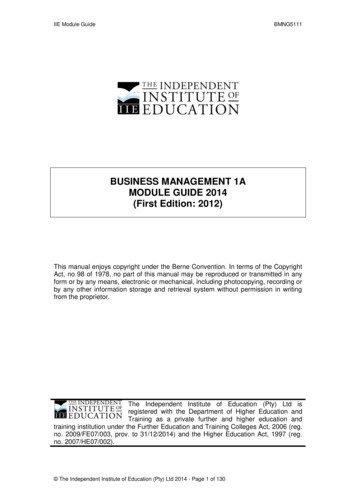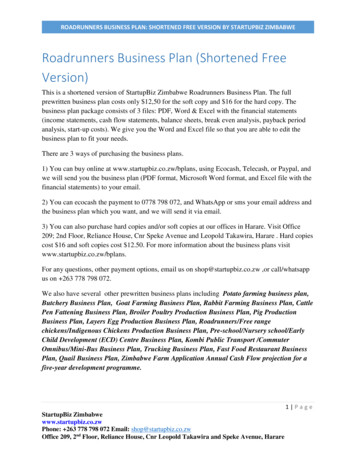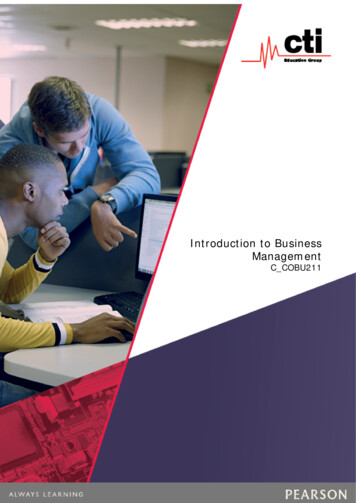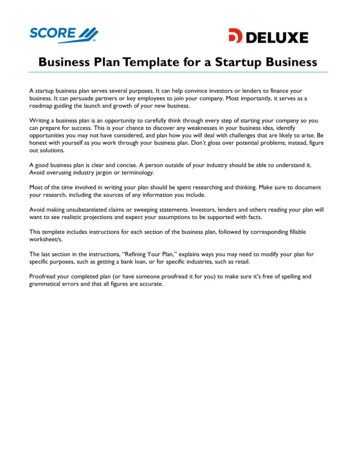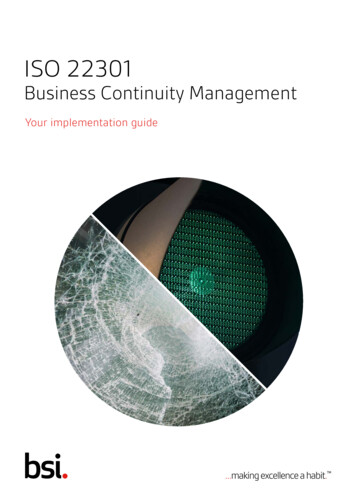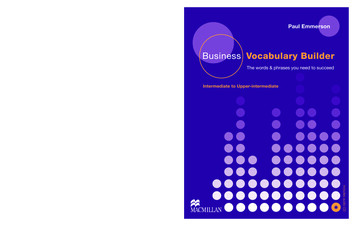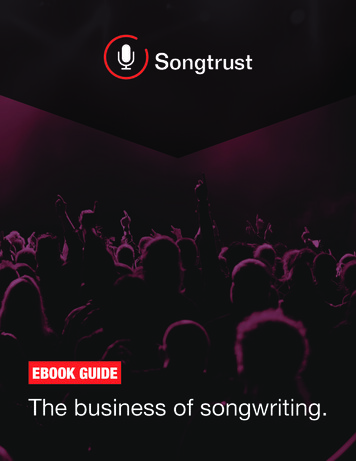
Transcription
EBOOK GUIDEThe business of songwriting.
"A wonderful, forthright guide to the ins and outs of what music publishing actually is, from a functional andrealistic viewpoint, focused on what songwriters (and those musicians who don't even know they aresongwriters yet) have questions about and should know."-Jeremy Peters, University of Michigan School of Music, Theatre and Dance.It is our goal at Songtrust to increase transparency andawareness about how songwriters support themselves. Songtrustprovides this education along with publishing administration service forall types of music industry figures--songwriters, labels, managers,lawyers, publishers, distributors, etc. We have designed this ebookto give you an overview of the business of songwriting.Note that terms in bold are defined in the glossary. Enjoy!-keep in touch with us through social media-
Table Of Contents1. Introduction . .42. Copyright & Ownership . .7Co-Writing3. Performing Rights Organizations (PROs) . . 12Affiliating and Registering Your SongsSamples4. Royalties and Licensing . . . .16PerformanceMechanicalPrintSync Fees5. Publishing Deals . . . .23Administration AgreementCo-Publishing AgreementWork-for-HireExclusive Songwriter AgreementCreating Your Own Publishing Company6. Songtrust . . .32What is Songtrust?7. Resources . . .35Collecting Master riting ToolsEducation8. Conclusion .419. Glossary . .44TermsSocieties & Organizations
Introduction
IntroductionAnyone who creates original music is a songwriter and can collectsongwriting royalties.Artists of every genre; composers, band members,film/television writers, DJs, and any owner of an original1 composition or song.is due royalties when their music is used around the world Unfortunately,making money from songwriting is not as straight-forward as your averagenine-to-five. However, there is now ample opportunity to earn money fromsongwriting. With the advent of Songtrust, along with several other new musictech startups, the modern day songwriter can take advantage of a myriad ofoutlets and revenue streams for their songs. It is important for songwriters toknow their options in order to curate their personal and professional approach.As a songwriter, you are the publisher and owner of your songs. Musicpublishing refers to the business of making money as the copyright holder ofthe music you write 2 . Copyright law protects songwriters by giving themexclusive rights to grant or deny the reproduction, distribution, or performance1If you make it, you own it. You can also collect royalties from cover songs, arrangements,and public domain songs. Further, we will discuss what happens with Samples later in theguide.2quite contrary to the popular belief that music publishing is the business of publishing sheetmusic.
of their work. When you write original music and register the copyrightscorrectly and comprehensively, you are able to start collecting royalties on thatmusic, provided that others are streaming, downloading, performing, orsynchronizing, that music.For many songwriters, publishing royalties can be their most consistentand dependable sources of income. Advances in digital music distribution andstreaming services have made it possible for independent musicians to maketheir music available to a vast audience via many different payment models.“Discovery” no longer depends upon an established music publishing companypitching music to exclusive connections. It is now possible for a songwriter tomaintain 100% ownership, publish their own music, and collect global royaltiesfor that music.This guide will go into detail about the many ways you can make moneyas a songwriter and music publisher. We will discuss Streaming/Sales,Synchronization, Performance, and more. Enjoy.
Copyright & Ownership
Copyright & OwnershipCopyright ownership is divided into two parts; the sound recording andthe underlying composition. Both parts collect royalties. The sound recordingrepresents the master recording of a song. Labels and Distributors collect soundrecording royalties. The underlying composition, a bit less tangible, representsthe structure, lyrics, melody, etc. This composition copyright belongs to thesongwriter(s) of the song, and their respective publishers. Think of acomposition as being embedded within recordings. Publishers and writerscollect composition royalties.A common misconception is that one doesn’t own their work untilthey’ve filed a formal copyright. However, the moment you decide that the songyou have been creating is finished and exists in some tangible form (such as alead sheet or recorded demo), you automatically own a copyright for that
composition and 100% of the publishing. It is your intellectual property. Undersome circumstances, you may want to file a formal copyright to be safe.As a songwriter, you are the publisher, until you have a publisher. Your100% ownership is divided into two pieces: the writer’s share (50%) and thepublisher’s share (50%).3If you decide to sign a publishing deal, the publisher will only take a cutof the publisher’s share and often take a percentage of ownership. If you decideto simply sign a publishing administration deal, where a company like Songtrustregisters your songs and collects global royalties on your behalf, you collect allof your money minus a small commission for administrative/business expensesand time spent on your behalf.3Sometimes these shares will be considered to be 100% each, adding up to a total 200% forthe ownership of the composition, but for the purposes of this guide, we’ll stick to 50% pershare, equaling 100% for the song as a whole
It is very important to use a publishing administrator like Songtrustbecause independent songwriters are unable to collect mechanical royaltieswithout a publishing entity. Songtrust acts as that publishing entity and collectsyour mechanical royalties. Without Songtrust acting as a publisher on yourbehalf, you miss out on 85% of the royalties you should get from streaming.Co-WritingIt is common for songwriters to work on songs together. Your cowriter(s) could be a fellow songwriter, your band members, a producer orarranger who works on the song, or even a friend who gives you a great titleidea. Each songwriter owns their own percentage of the song and thepublishing rights. He or she is entitled to publishing royalties based on thatownership. These percentages, known as splits, must be negotiated by thesongwriters.Examples of SplitsIt is very important in a co-writing situation to decide on the splits assoon as all writers agree that the song is finished. Otherwise, you may find
yourself in somewhat of a “he said she said” situation, and negotiations will getmessy. It’s also important that all co-writers are in agreement about when thesong was actually finished. When you bring the song to a recording session,will the producer or session musicians who arrange parts for the song receivewriting credit? You may or may not want that, but you’ll want it to be clearbefore the session, either way. A good way to set this in stone is to get it inwriting, perhaps in the form of a split sheet, and even to register the song withthe US Copyright Office. While having a physical copyright isn’t completelynecessary (as intellectual property is copyrighted as soon as it is created), itcan be helpful if you are ever involved in a lawsuit regarding the use of yourintellectual property. Another way to lock down your splits is to register thesong with a Performing Rights Organization or a PRO, which we’ll discuss inthe next section.Once a song becomes a joint work, meaning you’ve agreed that you areall co-writers and therefore co-owners of the song and copyright, the workbecomes a unitary whole. This means there is no “separate but equal” conceptinvolving the differentiation between the music and lyrics. If you’ve decided tosplit a song 50/50 between two writers because one wrote the lyrics and theother wrote the music, both writers now own 50% of both the music and thelyrics. For example, if the song gets a sync (we’ll discuss this concept morelater) in a film but only the instrumental version is used, both writers will stillreceive 50% of the royalties and sync fees.
@songtrustPerforming RightsOrganizations (PROs)
Performing Rights Organizations (PROs)A Performing Rights Organization or PRO is a society responsible forcollecting income on behalf of songwriters and music publishers when a songis publically performed. Restaurants, bars, clubs, radio stations, televisionnetworks, concert venues, streaming services, and any other entity that usesmusic in a public manner is required to pay licenses in order to play that music.They pay these license fees to the PROs, who in turn, pay out to the songwritersand publishers in the form of performance royalties.In the United States, songwriters can affiliate and register their songswith one of three PROs: ASCAP, BMI, or SESAC. The differences between thethree are subtle, and are outlined in the Glossary under Societies andOrganizations. Territories around the world each have their own Performing
Rights Organization that collects performance royalties for writers in thatterritory (we’ve listed these organizations in the glossary section). PROs in theUS collect performances royalties from public performances of your song withinthe US.If your music is being used outside of the US, you are owed royaltiesfrom those countries’ PROs. The best way to register your songs with foreignsocieties is through Songtrust. Songtrust has direct deals (read: no extra fees)that cover 120 territories. This is the most expansive (and least expensive)publishing administration deal that currently exists.Affiliating and Registering Your SongsWhen you affiliate with a PRO, you will receive an IPI number. This stands forInterested Parties Information. This number identifies you as a songwriter andconnects you with your songs to ensure that you’re receiving all royalties owedto you. You can also affiliate yourself as a publisher with your PRO. This processand its benefits are outlined below.After you’ve affiliated with a PRO, the next step is to register your songs. Thisis where you tell the PRO the name of each song, who wrote it, and who hasadministrative control of the publishing. Below are some important things toremember remember in order to properly register your songs.1. List any and all performers (artists) of the song.2. List any and all writers and/or publishers with their correct shares.3. List any alternate titles (i.e., if your song is called “2 Good 4 U,” list “TooGood For You” as an alternate title).4. Be sure your writer/publisher account has up-to-date contact information.
5. If you perform your songs live, report these using the variousprograms from ASCAP, BMI and SESAC to collect your live performanceroyalties. Songtrust also allows you to register live performances in othercountries.Once you’ve successfully registered your song, you’ll receive an ISWC. Thisstands for International Standard Work Code. An ISWC is a song’s identifier,which allows it to be tracked and royalties to be mapped to it.
Royalties & Licensing
Royalties and LicensingA royalty is a percentage of profit entitled to a creator or owner for theuse of their intellectual property. Simply put, any public use or sale of yourmusic will accrue royalties.PROs and collection societies issue licenses, track4 usage of music, andpay out royalties. Royalty rates differ greatly across platforms and venues andcontinue to be negotiated. Further, it is an enormous undertaking to track andmonetize the use of music throughout the world. The process involves massivedatasets and many codes and identifiers. As a result, registration andmonetization often takes months to complete.Below are the different types of royalties, and the mediums by whichthey are generated:Performance RoyaltiesPerformance has a broad meaning in the world of music. Essentially, it meansthe broadcast of a song in a public place. This means that any time your songis played at a concert, in a restaurant, at a sports game, in an elevator, etc., youare owed performance royalties. That includes if you perform your musicpublicly. Establishments and other businesses that use music pay license feesto the PROs in order to use their music.4with the help of tracking services
Performance royalties can be generated from:TV (This is not to be confused with the fee involved in the actual placementof your songs in TV, film or commercials)RadioLive venuesRestaurantsBarsElevator music servicesSupermarketsClothing storesGymsSamplingJukeboxOnline interactive streaming (e.g. Spotify)Internet radio/non-interactive streaming (e.g. Pandora)Mechanical RoyaltiesMechanical royalties have to do with the mechanical reproduction of a song,such as in the form of physical copies (CDs, vinyl, DVDs if your song is in a TVshow or film) or digital copies (mp3s, streams). The statutory rate for thesetypes of reproductions is 0.091 per song and is known as a “compulsorylicense,” as established by the Copyright Act. Rates for streaming arecompletely negotiated by the mechanical collection societies (such as HFA inthe US) and the Digital Service Providers (DSPs) who use the music.
Media that generate mechanical royalties are:Record salesOnline interactive streaming (e.g. Spotify)Internet radio/non-interactive streaming (e.g. Pandora)Collaborative listening (e.g. Turntable)Ringtones/ringbacksRecorded cover songsFilm soundtracksKaraoke recordings
Greeting cardsToys/accessoriesPrint RoyaltiesAs a copyright owner, you have the exclusive right to authorize others todisplay copyrights sheet music, or lyric reprints.This includes the following:Lyric reprintsGuitar tabsMusic sheet booksSync Licensing FeesWhen you license your song to be synchronized with visual media (such as ina TV show or movie), you are entitled to a sync licensing fee. This isnegotiated between the copyright owner (on both the publishing and mastersides) and the entity using the music. Sometimes songwriters/artists will agreeto license their music for free in exchange for the exposure of having theirmusic in the project. This is up to the copyright owners to decide.Visual media with which music can be synchronized:TV showsAdvertisements (Web & TV)Films & trailersVideo gamesSmartphone apps
DVDs / Blu-RaysYouTube videosDerivative Works1. Cover: If another artist makes a cover of the songwriter’s original song,the songwriters will get paid through mechanical licenses.2. Derivative Works: A derivative work is a new work that includes aspectsof a preexisting copyrighted work. Ex: A big band jazz arrangement ofthe song “Happy Birthday” would count as a derivative work. The originalcopyright owner can make money through licenses.SamplingA sample is a piece of a recording from a song that you don’t own usedin your own song. You can do this legally with permission from both the soundrecording owner, and the publisher(s) of the composition, as well as by payinga licensing fee to both sides, and sometimes by giving the writers of the songyou sampled writing credit on your song.The answer to the question ‘How much are songwriters paid?’ is complex. PROshave different music licensing rates for different venues. They get very specificand complicated. For example, there are different licensing rates when one’smusic is played at a polo match than there are at a roller skating rink, differentlicensing rates between a university and a theme park, and different licensingrates between using music on a jukebox and using music in a private club.
Nevertheless, if you are able to get your music played in a combination of theseoutlets, you can begin to build a revenue stream.For a better idea of how much money songwriters make, check out these visualsprovided by Information is Beautiful. Also take a look at the raw data fromthose infographics to see how rates differ for the writer’s share across platforms.55This data is from 2015. Rates and policies often change
@songtrustPublishing Deals
Publishing DealsWhen you’ve reached a certain degree of success independently as asongwriter, you may want to seek out representation in the form of a publishingdeal. A publishing deal is essentially an agreement with a publishing companyto provide administrative (and sometimes creative) support for your catalog, toleave you time to focus on what you do best: write. There are many differenttypes of publishing deals, but we’ll outline four of the most common below.Administration AgreementIn an admin deal, you--the songwriter--keep 100% ownership of your copyrightand give away 10-25% of your publisher’s share in the form of an administrativefee for a term of usually 1-3 years. Publishing administrators do not own orcontrol any percentage of your copyright at any point during or after the termof the agreement. Administration agreements ordinarily do not include any
creative services and focus solely on administrative duties such as properlyregistering your songs with collection societies around the world as well ascollecting royalties on your behalf. Admin deals can occasionally include anadvance, which must be recouped in the same way as in a co-publishing deal.Publishing administrators like Songtrust have relationships with performanceand mechanical collection societies around the world that make royaltycollection much simpler than it would be for a single songwriter to do on theirown, and this leaves you time to focus on writing as well as to work on pushingyour songs creatively.Co-Publishing AgreementAs the songwriter partaking in a co-publishing agreement, you typicallygive away 50% ownership of your publisher’s share to the publisher with whichyou sign (hence the name "co-publishing"). In doing so, you retain 100% ofyour writer’s share and 50% of your publisher’s share, therefore you will receive75% of your total publishing royalties. The term of these agreements is typicallyone year, though the publishing company can exercise options to renew thedeal if certain stipulations of the contract are met. Within the term, you, thesongwriter, will have certain obligations, such as submitting a minimum numberof songs that are commercially satisfactory. If you have co-written any of thesongs being submitted, only the percentage that you have written will counttowards satisfying the minimum amount of songs agreed upon in the contract(i.e., if you write 50% of two songs, it will count as one full song towards yourminimum requirement). Sometimes the agreement will also require that anumber of your songs are recorded and released by an artist on a label.
Because the publisher takes partial ownership over the works, they havemuch more of an incentive to exploit your compositions and generate royaltiesfrom them. They will do this in a number of ways: pitching your songs to musicsupervisors for synchronization in television, film, and advertising, as well as tolabels to be recorded and released by major artists, and by setting you up onco-writes with artists and other songwriters. In addition to this creative work,your publisher will also be doing all of the necessary administrative duties, suchas registering your songs with PROs and collecting royalties on your behalf.Though you retain ownership of 50% of the publisher’s share in this deal,you are often giving away 100% creative control over the song itself. Thismeans you will have little say in how the song is used (aside from what isagreed upon in terms set by the initial contract, i.e., not allowing yourcompositions to be used for political campaigns or in inappropriate content).This control will often be granted to the publisher in perpetuity, meaning thepublishing company will retain rights to your compositions written under yourdeal with them, even after your deal is over. There are certain laws in place thatallow you to have your rights reverted back to you a number of years after thetermination of your deal (normally 35-40 years).One of the most enticing aspects of a co-publishing deal is the advance.Publishing companies will customarily offer you a sum of 25,000- 250,000upon signing the contract. This can be alluring for a songwriter, because itmeans you can quit your day job and focus all of your energy on writing. Butit’s important to know that this advance must be recouped in full by thepublisher before you are paid out any royalties from your compositions.Typically, the publisher will collect their 25% (50% of the publisher’s share), andset your 75% (100% writer’s share and 50% publisher’s share) against your
advance until it is paid back entirely. It is only then that you will begin to bepaid 75% of all future income your songs generate.Work-for-HireIn a work-for-hire agreement, for a flat fee, you give up all ownership andadministration rights for your works for the life of the copyright. This meansthat you are not entitled to any publishing royalties earned by the compositionin the future, and you do not even need to be credited as the composer. Theseagreements are most common in film and advertising when the film studio orproduction company wishes to own and control all aspects of the production.Exclusive Songwriter AgreementUnder an exclusive songwriter agreement or “staff writer” contract, thesongwriter generally assigns the entire publisher’s share of any songs written
during the term of the agreement to a publishing company. In exchange, thepublisher provides the songwriter with an advance paid out on a weekly,monthly, or quarterly basis like a salary, and must be recouped in the same wayas in a co-publishing or administration deal. These salary-like advance paymentsare the draw of this type of deal, as a songwriter can feel a bit more financiallysecure. The publisher will also perform administrative and creative duties forthe writer’s catalog within the agreement. This type of deal is usually offered towriters who have already demonstrated a good deal of success so that thepublisher is confident that they will receive a return on their investment.Creating Your Own Publishing CompanySongwriters have quite a few different options when signing a publishing deal.But as an independent songwriter you are already your own publisher, andthere are major benefits to exploiting that opportunity as well. So whetheryou’re just starting out or you’ve been around the songwriting block a fewtimes, know that you can take control of your own publishing.
You can register a publishing company with a PRO in basically the same wayyou register as a writer. That publishing company will serve as a separatebusiness entity and your publisher’s share will be distributed to that entity. Bothchecks will come to you, just as they would if you were solely registered as asongwriter, but the publisher’s share will be made out to your publishing entity.Note: If you’re affiliated with ASCAP, you must register as a separate publishingentity in order to collect both your writer’s share and your publisher’s share. Ifyou’re affiliated with BMI, you will receive two separate checks--one for yourwriter’s share and one for your publisher’s share--whether you’ve registered apublishing entity or not. The benefits of creating this publishing entity aresimilar to those of creating an LLC or incorporating a personal business--itallows you to earn income, pay taxes, and do business in general as an entity,rather than an individual, and protect yourself and your personal assets frombecoming personally liable for business debts.Creating your own publishing entity will not prohibit you from signing a copublishing or admin deal in the future. In that case, your publisher would justsend a letter of direction to your PRO, notifying them that they will be takingadministrative control of your catalog on your behalf. Below are some steps tocreating your own publishing company:1) Decide on a name.You will need a unique name so that royalty payments don’t get improperlyassigned. When you go through your affiliation process (see step 2), you willbe required to submit a few potential names.2) Affiliate with a Performing Rights Organization.
Apply to affiliate as a publisher with ASCAP, BMI, or SESAC. If you are publishingyour own music, you will need to affiliate with a performing rights organizationas a songwriter first. Affiliate as a publisher with the same society you areaffiliated with as a writer. If you will be publishing music from other writers, youshould affiliate with all of the organizations with which your writers are affiliated.Approval to become a writer or publisher affiliate takes several weeks and thereis typically a fee involved to apply.3) Register in your area for a fictitious business name or “DBA” name.DBA stands for “Doing Business As.” These forms can be found at the Secretaryof State’s office website for your local state. There are fees involved in obtaininga DBA.The publisher will also perform administrative and creative duties for the writer’scatalog within the agreement.You will use this account to collect royalties earned from your publishingcompany.4) Register your company’s songs with your PRO.5) Get a publishing administrator to handle local and internationalregistration and royalty collection.In order to collect royalties globally (i.e., outside the US or wherever your localPRO is located), you will need to become affiliated and register your songs withlocal performing rights organizations. To do this however, you will need to gothrough a laundry list (much longer and pricier than this one) of paperwork andlegal work. Instead, you can join a publishing administration service such asSongtrust to handle administrative work for you.
Songtrust
SongtrustSongtrust, a Billboard Magazine Top 10 Music Start-Up, provides a technologyplatform for royalty collection services to independent songwriters and musicbusiness professionals. Our industry-leading online solutions help songwriters,artists, managers, labels, distributors, and publishers simplify music rightsmanagement, including the administration of music publishing assets,performing rights, and digital licensing.Launched by Downtown Music Publishing CEO Justin Kalifowitz in 2010,Songtrust provides efficient and accountable royalty collection services in over50 major music markets worldwide.Before Songtrust, most songwriters were unable to collect global royalties forthe performance of their music. Local PROs are unable to collect all foreignperformance royalties owed to songwriters, and the royalties they can collectare subject to many fees, leaving the songwriter with a fraction of their royalties.With Songtrust, songwriters are able to register their songs directly withcollection societies across the globe and collect every penny they are owed.Songtrust offers:Registration with a PRO if you’re not already affiliated--skip the PROapplication feeOne-stop global song registration with performance and mechanicalcollection societies worldwide, including ISRC dataGlobal royalty collectionLive setlist submission – collect your live performance royalties
Detailed royalty reports and payment by direct depositYouTube Claiming and Monetization ToolResponsive and sophisticated client serviceQuality educational resources about songwriting and music publishingSongtrust is unique because of its direct relationships with collection societiesthroughout the world, which means you avoid the commission fees that subpublishers and domestic PROs take. Songtrust can handle catalogs of any size,from one song to a publisher or distributor’s entire catalog. Songtrust’s techfocused, progressive team is focused on resolving the inefficiencies within musicpublishing and creating fair solutions that enable independent songwriters tosupport themselves.Find out more about joining Songtrust by visiting our website, or send usan email at help@songtrust.com Learn how to navigate as a SongTrust userhere
Resources
ResourcesCollecting Master RoyaltiesThe PROs, the Harry Fox Agency, Songtrust, and other music publishers collectroyalties on behalf of compositions. If a songwriter also owns his or her ownmasters, he or she can also collect royalties on behalf of the sound recordings.Register your songs with SoundExchange to collect royalties generated whenyour recordings are broadcast publically via digital radio services, webcasts, andon cable television.If you cover songs that you didn’t write and you own the recordings, Loudrhelps you license them to collect royalties.Selling RoyaltiesRegistering with an online service like RoyaltyExchange is another avenue fromwhich you can monetize your music by allowing you to sell part of your royaltiesto a community of buyers.Royalty AdvancesServices like LyricFinancial offer financial solutions and royalty advances tonurture the development of the independent music community. If you rely onthe revenue your songs earn to make ends meet, then lyric financial can provideadvances on your royalties.Tools for Independent Artists
DistributionNowadays, the main function of distributors is to get your music onto streamingservices like Spotify, iTunes, Amazon Prime, Google Play, Deezer, etc.Distribution companies also place your music in physical stores like Bestbuy,Barnes & Noble, Target, Walmart, and even local record stores. There are manyoptions for independent distribution, such as CDBaby or DistroKid.SynchronizationSynchronization is a great way to monetize your music. Below is a list of servicesthat can help you pitch your music for synchronization in film, TV, advertising,and video games:Sound Gizmo, part of SynchTank, a s
songwriting royalties. Artists of every genre; composers, band members, film/television writers, DJs, and any owner of an original1 composition or song is due royalties when their music is used around the world. Unfortunately, making money from songwriting



